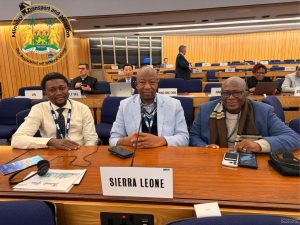Islamic Development Bank $40 Million Livestock Project Aims to Boost Food Security in Sierra Leone

The Ministry of Finance (MoF) is taking significant steps to mobilize resources for key government priority programs, including the ambitious Feed Salone initiative. In this pursuit, the MoF is actively engaging with development partners to secure crucial interventions that will help achieve its developmental objectives. A long-standing and trusted ally in this effort has been the Islamic Development Bank (IsDB), which recently completed a comprehensive feasibility study across Sierra Leone aimed at implementing a transformative $40 million Livestock Project.
During a recent briefing meeting, Deputy Finance Minister 1, Mrs. Kadiatu Allie, expressed heartfelt gratitude to the IsDB for its unwavering support for the government and people of Sierra Leone. She emphasized the strategic importance of the Livestock Project in achieving the goals set forth by the Feed Salone Programme. “This initiative is vital for enhancing food security and improving local livelihoods,” she asserted, noting that strengthening the livestock sector is essential for reducing the nation’s dependence on imported food products.
Mrs. Allie assured the IsDB of the Ministry’s commitment to providing a dedicated technical team to support the project’s development at both short and long-term stages. This support includes facilitating discussions with local stakeholders and ensuring that the project aligns with community needs and government priorities.
Minister of Agriculture Dr. Henry Musa Kpaka elaborated on the ambitious scope of the livestock project under the Feed Salone Programme, known as the BIG FIVE. He highlighted that the recent mission visit by the IsDB represented a crucial step beyond a mere feasibility study; it signified a move towards securing a firm financial commitment of $40 million. Dr. Kpaka expressed optimism that the anticipated involvement of OPEC would further bolster the initiative, aiming to reach a target of $100 million for the comprehensive livestock project.
“This will be a flagship project for livestock in Sierra Leone,” Dr. Kpaka declared. He emphasized that until now, there had been insufficient funding allocated specifically for livestock under the Feed Salone Programme, making this project particularly significant. By focusing on local production, the project aims to drastically reduce the importation of chicken and eggs, which currently burdens the national economy.
The groundwork for the Livestock Project has involved extensive preparations, with Dr. Kpaka detailing a series of proactive steps taken by the Ministry of Agriculture. These include thorough field visits to assess local conditions, hiring specialized consultants to support the poultry sector, and conducting in-depth feasibility studies. “We have developed a comprehensive overview of the project components and created a cost breakdown across various regions,” he explained. This meticulous preparation aims to ensure that the project is both feasible and sustainable.
The funding structure of the project is designed to be inclusive, combining grant elements with highly concessionary financing. This multifaceted approach will ensure a variety of funding sources to meet the project’s objectives during the implementation phase, allowing for a more robust financial framework.
Sabiu Auwal, the IsDB Operation Team Leader, explained that the mission’s primary objective is to identify specific activities that the bank can finance and to confirm the government’s priorities for livestock development in the country. He reassured the ministers that all collected information would be presented to the project preparation board. Once the board grants clearance, an appraisal mission is slated for October, paving the way for the project’s next stages.
Auwal highlighted key components of the proposed project, which encompass a range of activities aimed at fostering growth and sustainability in the livestock sector:
- Empowering Women and Youth in Livestock: Initiatives designed to engage women and youth as active participants in the livestock industry.
- Animal Health Training: Providing essential training to ensure the health and well-being of livestock.
- Infrastructure Development: Constructing necessary facilities to support livestock management and production.
- Animal Vaccinations: Implementing vaccination programs to prevent diseases that affect livestock.
- Storage and Market Facilities: Establishing facilities to enhance storage capabilities and market access for livestock products.
- Slaughterhouses: Building modern slaughterhouses to ensure hygienic processing of meat.
- Medium-Sized Enterprises: Setting up businesses that will create jobs and stimulate local economies.
- Capacity Building: Enhancing the skills and knowledge of stakeholders involved in the livestock sector
Financial Secretary Matthew Dingie expressed enthusiasm for the business-oriented aspects of the arrangement, particularly regarding the establishment of medium-sized enterprises designed to support the repayment of loans through revenue generated from sales. “When the community understands that it’s a business initiative, they will be less likely to misuse resources for celebrations and will prioritize repayment to the appropriate authorities,” he explained, emphasizing the importance of instilling a sense of responsibility among beneficiaries.
The collaboration between the Ministry of Finance, the Ministry of Agriculture, and the Islamic Development Bank marks a significant step forward in advancing livestock production in Sierra Leone. By leveraging funding and technical expertise, the Livestock Project aims to enhance food security, create jobs, and contribute to the nation’s economic growth. As the appraisal phase approaches, all stakeholders remain committed to ensuring the project’s successful implementation.
This initiative not only promises to uplift the agricultural sector but also aims to foster community resilience and self-sufficiency, ultimately paving the way for a sustainable and prosperous future for Sierra Leone’s livestock industry. As the country moves forward, the hope is that the Livestock Project will serve as a model for future agricultural initiatives, demonstrating the positive impact of strategic partnerships and community engagement in driving national development.





